Investors have grown increasingly nervous about the chance of a U.S. debt default in recent weeks, with one analyst describing a potential default as a 'neon swan' event.
First coined by author Nassim Nicholas Taleb in 2001, the term 'black swan' event is understood by most to be an unthinkable event that it as unpredictable in advance as it is in hindsight. In contrast, a 'neon swan' event, although also seen as unthinkably rare, is more obvious in the buildup.
"This is not even a black swan event. This could be referred to as a neon swan event, if you will," said Ben Lichtenstein, president of audiotraders.com.
(Read More: No way US would allow debt default? Don't bet on it)
Lichtenstein said he chose the 'neon swan' description to draw attention to the severity and unprecedented consequences of a default.
"There are multiple indeterminable consequences of a default. None of which are good. It's my opinion that just like market direction, nobody can truly predict what type of an environment a default would create," he added.
Talk of a 'neon swan' emerged in July 2011, when the U.S. government faced a similar predicament – locked in a political stalemate over the same debt ceiling debate. At the time investors were also panicked over the prospect of a default and its implications for markets worldwide.
(Read More: First a default, then a depression? Some think so)
The U.S. government shutdown was set to move into its ninth day on Wednesday following politicians' failure to agree on renewing the federal budget into the new year. Attention has turned to the looming October 17 deadline by which the U.S. must raise the debt ceiling to avoid defaulting on its debt.

The International Monetary Fund this week warned that a default would push the economy back into recession and cause "major disruptions" for global markets.
While Lichtenstein agreed with the general consensus that such a scenario will ultimately be avoided, he noted that the risk was not to be ignored.
(Read More: Cramer: Default 100 times bigger than Lehman?)
"I don't think they really will let a default happen, but there is good potential [for a default]… and obviously already we are starting to see concerns about [the U.S.] rating and a possible downgrade of that," he said.
All three major ratings agencies - Fitch, S&P and Moody's – have warned on potential downgrades to their U.S. debt ratings in varying degrees if the debt ceiling limit is not raised.
On Sunday, House Speak John Boehner warned that the U.S. was on path to a credit default in an interview with ABC's This Week.
(Read More: IMF: What a month-long shutdown could look like)
However Raymond McDaniel, CEO of Moody's, ruled out the chance of a default in an interview with CNBC.
"It is extremely unlikely that the Treasury is not going to continue to pay on those securities," McDaniel said.
— By CNBC's Katie Holliday: Follow her on Twitter @hollidaykatie


